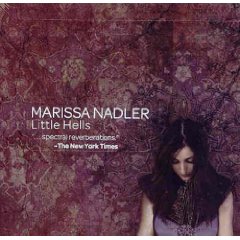In terms of a broad genre, folk music is not easy to pull off anymore. That is to say that hearing a solitary artist who is engaging is difficult to come by these days. There are so many singer/songwriter types out there that are unmemorable, mainly because a good percentage of them blatantly and ineffectually rip off the likes of pioneers such as T. Rex, The Incredible String Band, and even Judy Collins to name a few examples. Marissa Nadler, however, is a rare exception. Her last album, Songs III: Bird on the Water, was a haunting work of originality and now we have been granted Little Hells, an unwavering, defining type of album that even tops her previous effort.
This new record is astonishingly good. Her ghostly vocals, soaked in reverb and ether, sound wonderful. The songs are first rate and she has more of a band backing her on this recording, which gives the music life, making the songs quite powerful. Concerning accompaniment, there is also more variation, something that very much pushes this recording outside of the garden variety ‘folk’ label. Nadler’s otherworldly vocals are augmented by organs, pianos and pounding drums in addition to her agile acoustic guitar on this collection of songs. Little Hells sounds like gothic folk music, but is really neither because the material is powerful and sparse in a commanding and often menacing kind of way.
“Heart Paper Lover,” the album’s opening song, sounds like it could have been written by Shannon Wright. An eerie Wurlitzer piano is the prominent instrument backing the singer. In fact, this track doesn’t even feature a guitar, which is something of a departure for Nadler. Her vocals are forlorn, sullied with immense regret. The simple line, “Life seems so empty without you, my friend,” is in itself utterly heartbreaking.
“Mary Come Alive” is another unique standout. Psychedelic electric guitar reverberates just above some heavy tribal sounding drums. Once again, her lovely phantom voice still manages to take center stage even though the music is altogether captivating. “River of Dirt” is exactly that, a weaving Southern tale of abandonment complete with a full band consisting of lap steel guitar and piano in addition to acoustic and electric guitars.
For those familiar with her previous records, there are some bare acoustic moments on Little Hells as well. The title track is a sorrowful concoction of acoustic guitar and lowly mixed organ. “Ghosts and Lovers” is perhaps closest thing in sound to the stripped down Leonard Cohenesque Songs III: Bird on the Water. The blend of finger-picked guitar and solitary empty hall ambience are almost unnerving. “Mistress on a Sunny Day,” another full group effort, closes the record with fallen resignation. Here, in a final statement, Nadler casts off her shadows and takes the wheel of this ambulance in an attempt to drive her encumbering remorse over some precipice.
Little Hells is by far Marissa Nadler’s best album to date. It blows her last one away and I thought that the previous offering was rather good. In fact, Songs III was my introduction to Nadler and I was surprised at how much I enjoyed it, but this recording really finds her catching some kind of incredible stride that already puts it at the top of my list for best albums of the year, and yes it is only March.
